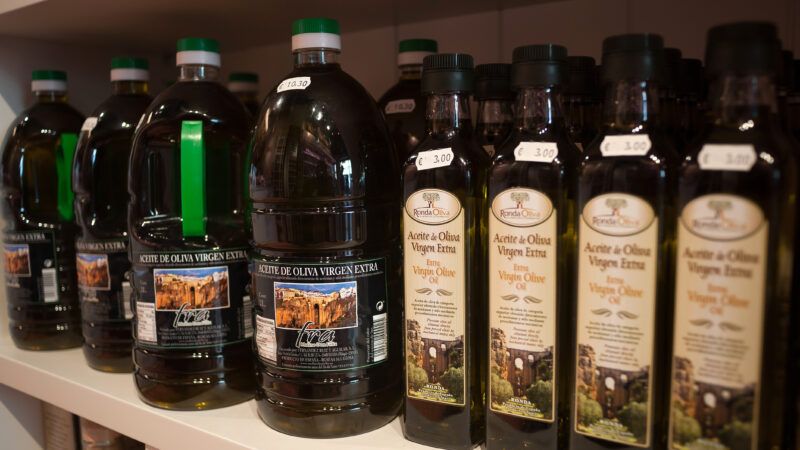Joe Biden and the E.U. Move To Lift Trump's Food Tariffs
Trade news worth celebrating with a fine French wine.

During his first presidential visit to Europe, President Joe Biden and his European Union counterparts this week hammered out an important agreement to suspend pointless retaliatory tariffs targeting a host of foods. The Washington Post called this week's agreement, which suspends the tariffs for five years, "a significant step in calming trade relations after the fury of the Trump years."
As I've detailed several times in recent years, the tariffs arose out of a longstanding dispute (and subsequent World Trade Organization rulings) over dueling subsidies doled out, respectively, by the U.S. to domestic airplane manufacturer Boeing and by the E.U. to bloc aircraft maker Airbus.
Rather than limiting that dispute to airplanes, the Trump administration and E.U. foolishly escalated and expanded the conflict. In 2019, the Trump administration, the Wall Street Journal noted this week, turned the dispute "into a tariff fight that snared food and beverage industries unrelated to aircraft manufacturing." That tariff fight "saw tit-for-tat duties slapped on a range of companies that have nothing to do with aircraft production, from French winemakers to German cookie bakers in Europe and U.S. spirits producers in the United States, among many others," CBS News reported.
This week's lifting of tariffs builds on an earlier temporary agreement between the Biden administration and E.U. leaders, reached in March, that lifted tariffs on a host of foods, including wines, whiskey, cheese, olives, nuts, and cherries.
Those tariffs harmed foreign and domestic food producers and consumers alike. Their predictable negative impact has been widespread.
I was one of many to forecast, in a 2018 column, that Trump's food tariffs would cost jobs and hurt U.S. and foreign producers, consumers, and taxpayers. Sure enough, in a column one year later on the impact of those tariffs, I noted a study published by the National Foundation for American Policy, a nonprofit that focuses on trade issues, that found the Trump administration's tariffs would cost the average American consumer more than $600 per year. More recently, in an excellent piece last week on Kentucky's historic James E. Pepper whiskey distillery, CNN reported Trump's tariffs had caused the whiskey maker to lose three-quarters of its European business.
Shortly after Biden's election victory, I urged him to lift all of Trump's food tariffs. After Biden's inauguration, I joined dozens of food industry groups and others in urging him to eliminate those food tariffs.
The suspension of these U.S. and E.U. food tariffs is timely. Growing domestic and foreign demand for meat, coupled with increased feed and energy costs, has driven up consumer prices for steaks and bacon. But tofu is pricier, too. This broad food inflation is causing sticker shock for consumers. Lifting these pointless food tariffs should help businesses grow while letting consumers keep more of their earnings.
This week's agreement, though very good, is imperfect. It leaves some non-food tariffs still in place. And the agreement could evaporate after five years—or sooner if the E.U. violates the terms of the agreement, notes senior Biden administration official Katherine Tai. This week's agreement also doesn't impact equally lousy Trump-era tariffs on Chinese goods. And, in the wake of Brexit, while the E.U. and the United Kingdom are busy playing tariff games that hurt members of each bloc—including Irish dairy and whiskey producers—there's always the chance new tariffs could arise and target the United States.
Tariffs—whether targeting food or other goods—are grounded in an unwelcome mix of nationalism and a misunderstanding of the benefits of free trade. They harm consumers and producers alike. They're a lose-lose proposition. While I'd have preferred the Biden administration lift all food tariffs as soon as he took office, Pres. Biden deserves credit for reducing barriers to freer trade for all Americans.

Show Comments (81)